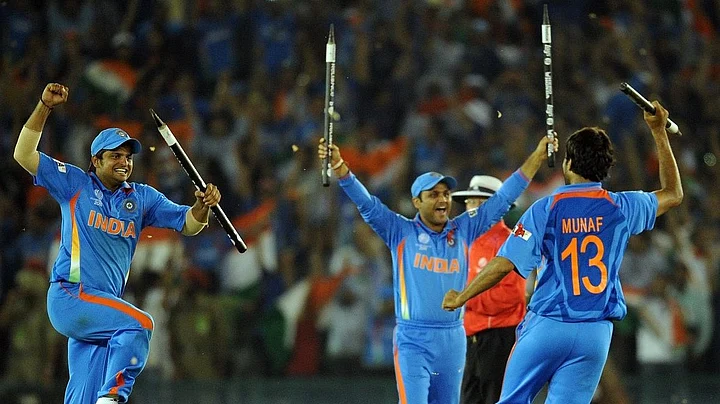India has entered the semifinal of ICC World Cup for the seventh time in the history of the tournament. After the embarrassing debacle in 2007, the Men in Blue have at least been making it to the semis for three years now, even lifting the trophy in 2011.
Although the four semifinalists had been decided earlier, the final two ties on 6 July – the last day of the league stage – changed the equation as India ended up topping the table after Australia lost to South Africa.
So far at ICC World Cups, India’s success rate in semifinals has been 50 percent, with three wins and as many loses. Australia on the other hand, have a 100 percent strike rate; having won all seven semifinals that they have played.
And out of the six semis that India has played, three stand out because the proceedings were against the run of play, and the final result left people awestruck. In one out of those three times, Indian fans rejoiced while the other two were occasions of mourning for them.
The third and the fourth editions of the ICC World Cup took place in the eighties – one in 1983 and the other in 1987. And in both of those editions, India and England played each other in the semi-final.
Both matches also have a unique similarity in their outcome. In 1983, England was the host and favourites against India, but the Kapil Dev-led won the semifinal in front of English crowds. Four years later in 1987, it was payback time. India was the host and favourite against England, but Mike Gatting’s men won the semifinal in front of their opponent’s home crowd at the Wankhede Stadium in Mumbai (then Bombay).
India’s voyage in the 1983 World Cup is an epic, a sort of folklore now for fans. From being the bona fide underdogs, Kapil’s devils reached the semis for the first time, where they were up against England. Despite their heroics in the group stage, no one was ready to put their money on India in the knockouts.
For the second time in a row, a West Indies-England final had been on the cards (both played the 1979 WC final). And even before the semi-finals had been done with, large cut-outs of Viv Richards and Ian Botham had been started to be put at the Lord’s for the 25 June final. India, however, changed the narrative with an emphatic victory over the hosts. Kirti Azad and Mohinder Amarnath gave away just 55 runs in their 24 overs and restricted a potent batting line-up to just 213 runs. Indians were slow and steady in the chase and in the end; Patil scored a quick-fire half-century to seal the match.
Four years later, England handed India the same humiliation in the semi-final of the 1987 World Cup. India was co-hosting the World Cup with Pakistan, and were also the pre-tournament favourites. India won five out of their six group matches – losing to Australia only by a run – and topped their group. England finished second in the other group.
The Indian batting was on a roll in ‘87 World Cup. Gavaskar – who drew curtains on his career after that tournament – was going great guns at the top of the order with Kris Srikkanth. Vengsarkar, Azharuddin, Sidhu, Kapil and Kiran More, who were also among the runs.
The Indians were so ferocious with the bat that in the last group match, India chased down 221 runs against New Zealand in just 32.1 overs. Gavaskar scored his only ODI century in that match, and along with Srikkanth amassed 136 runs for the opening stand at a run rate of more than seven.
Looking to go past England in the semifinal, an overconfident Indian side was routed by Graham Gooch’s top-notch century. He handled Indian spinners in a gutsy manner. Indian fans were hoping that Gavaskar and Srikkanth would recreate the magic of the previous match, but none of that happened. Gavaskar failed in his last innings for India and so did Srikkanth. Hemmings removed Kapil, Azhar and Shastri, and India lost the match. If 1983 made Kapil a hero, he was made the scapegoat after the 1987 loss. He was sacked from captaincy, which he failed to re-claim till his retirement in 1994.
After 1987, when India hosted the World Cup again in 1996 (along with Pakistan and Sri Lanka), the Men in Blue had a heartbreak similar to the one in 1987.
India played Sri Lanka at Eden Garden Kolkata in the semi-final. It was advantage India particularly after India got rid of dangerous Jayasuriya and Kaluwitharana in the first few deliveries itself. Arvind de Silva and Ranatunga built the innings cautiously to 251. Indians were well set with a scoreline of 98 for 1 but then the pitch started turning square all of a sudden, wickets began to tumble as the hosts were reduced to 120 for 8. It was sheer disaster. The whole nation mourned the debacle.
As hosts in 2011, India smiled in its third attempt when they went past Pakistan in the semis.
In 2019, India is set to play New Zealand first time in a knockout match at the history of ICC World Cup. The run of play suggests that India should cruise easily and fans like me can only hope that things don’t turn unexpectedly, as has happened in 1987 and 1996.
(The writer is an IIT graduate with a passion for sports, history and politics and can be reached at @pankajag1973)
(At The Quint, we question everything. Play an active role in shaping our journalism by becoming a member today.)
